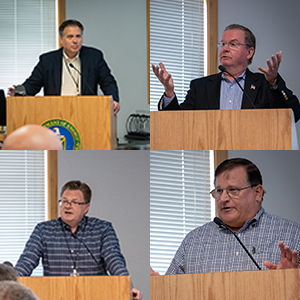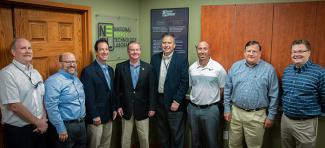A U.S. Department of Energy Office of Fossil Energy (FE) leadership team headed by Assistant Secretary for FE Steve E. Winberg visited NETL’s Albany, Ore., site Wednesday, Aug. 29, for detailed tours of the Laboratory’s technical facilities, briefings by NETL experts, and a site-wide employee town hall meeting.
Winberg was joined by Deputy Assistant Secretary for Clean Coal and Carbon Management Lou Hrkman, and Deputy Assistant Secretary for Oil and Natural Gas Shawn Bennett for the Albany visit. They were hosted by NETL Acting Director Sean Plasynski, NETL Chief Financial Officer Jim Wilson, and NETL Research & Innovation Center Executive Director Bryan Morreale.
During the town hall session, Plasynski introduced the DOE visitors and Winberg delivered remarks to brief employees about DOE initiatives and priorities before taking questions from the audience.
In the afternoon, the delegation was briefed on these Albany research topics and took a detailed tour of related Albany facilities:
- Alloy design and manufacturing – Melt Processing and Thermal Processing Labs
- Materials and geo-materials characterization – Scanning Electron and Microscopy Lab
- Materials performance and mechanical behavior – Fracture Mechanics Lab
- Materials performance and high-temperature corrosion – Severe Environment Corrosion Erosion Research Facility and Related Laboratories
- High performance subsurface – High Pressure Immersion and Reactive Transport Lab
- Materials performance corrosion – Corrosion and Electrochemistry Lab
- Direct power extraction – MHD Lab
- Geology and geospatial analysis – Geospatial Analysis Interpretation and Assessments Lab
NETL researchers who provided briefings to the visitors included Paul Jablonski, Jeffrey Hawk, Circe Verba, Gordon Holcomb, Richard Oleksak, Nicolas Huerta, Randall Thomas, Margaret Ziomek-Moroz, Lee Aspitarte, Kelly Rose, and Jennifer Bauer.
Winberg is responsible for the management and oversight of FE’s research and development program, encompassing coal, oil, and natural gas, as well as the Office of Petroleum Reserves. He has over 40 years of experience in the energy industry. He began his career at the engineering firm Foster Wheeler as an engineer on coal-fired utility boilers and spent 14 years with Consolidated Natural Gas, becoming vice president for CONSOL Energy Research & Development. Immediately prior to coming to DOE, Mr. Winberg served as a senior program manager at Battelle Memorial Institute.

Winberg has experience in a range of energy technologies, including advanced fossil energy combustion, coal-to-liquids, fluidized bed combustion, emulsified fuels, fuel cells, alternative fuel vehicles, and carbon utilization.
Hrkman has more than two decades of experience in the energy industry, including work in both the public and private sectors. He served as a policy adviser to U.S. Congressman David D. McKinley (W.Va.), and legislative fellow for U.S. Congressman Gus Bilirakis (Fla.). He was business development manager at Ingersoll Rand Inc. and held management positions at Siemens Industry Inc.
Bennett has more than a decade of experience in public affairs and government relations in the coal, oil, and gas industries. He served as the executive vice president for the Ohio Oil and Gas Association, director of strategic communications for FTI Consulting and government affairs manager for the Ohio Coal Association.
Situated on 42 acres, NETL’s Albany, Oregon, complex has specialized facilities for materials fabrication and performance testing of advanced high-temperature, corrosion-resistant structural ceramic composites and metal alloys. The site is internationally recognized for its leadership in designing, developing, and deploying advanced materials for use in energy applications and extreme service environments. NETL Albany is in the heart of an area that is rich with key metals industries that are critical to the nation’s economic health.
The Laboratory has made significant contributions in the areas of materials research. In 1984, ASM International, the world’s largest and most established materials information society, recognized the laboratory for pioneering the process of making ductile zirconium and designated the site an ASM Historic Landmark.
More recent contributions include: development of radiopaque alloys for medical coronary stents; enhanced processing methods to improve armor materials for military applications; computational tools for heat treating and homogenization processing of superalloys; development of improved heat-resistant alloys; and development of modified chrome-oxide refractory brick material for slagging gasifiers.
Contact:





